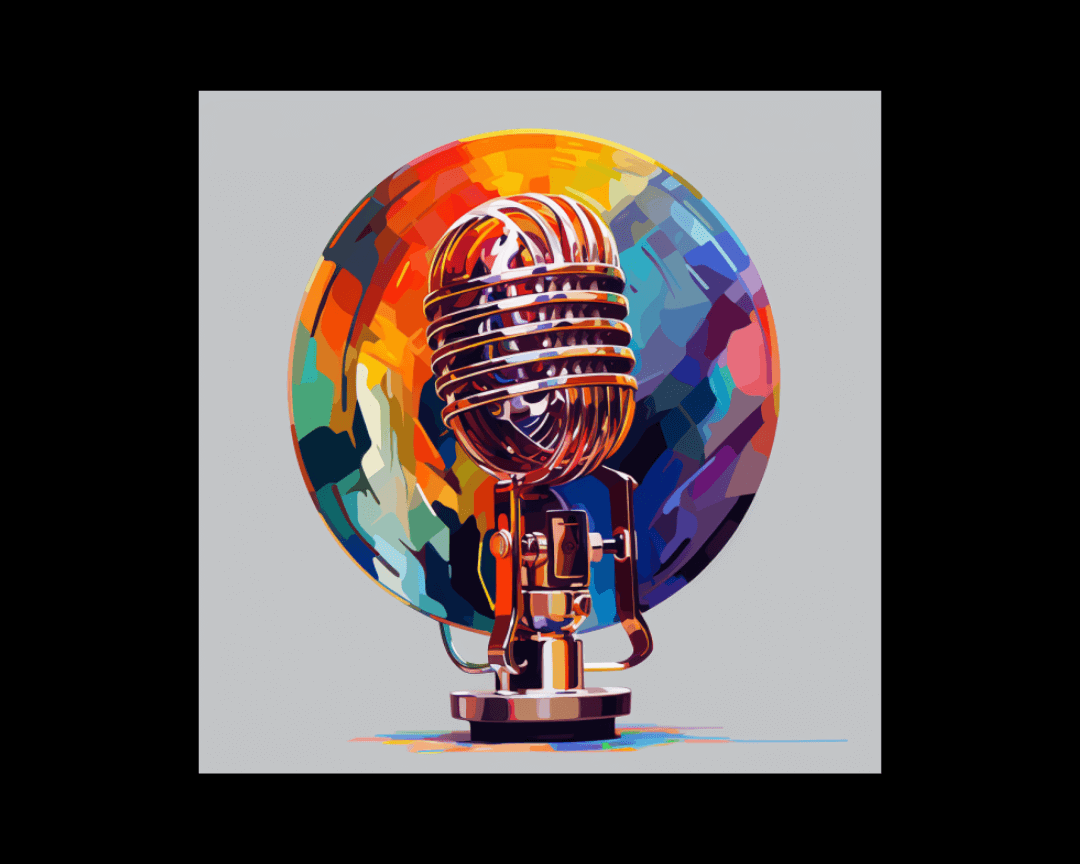AI and Podcasts: Summary of an Interview with Riverside's Head of Marketing
Podcasts and videos are potent avenues for expanding audiences and bolstering brand recognition.
6 min read
 Lindsey Blackmore
:
Apr 11, 2023 5:48:47 PM
Lindsey Blackmore
:
Apr 11, 2023 5:48:47 PM

Podcasts: you’ve likely listened to one in the past month. Maybe you have a list of favorite shows you stay up to date with. Maybe you have something important to say and have considered starting your own show.
If so, now is the time to get into podcasts. The leading podcast platform, Spotify, hosts more than 5 million podcast titles with an active audience of nearly 490 million users. While more people are turning to video platforms like YouTube and TikTok to search the web, auditory learners are browsing their Apple Podcasts and Spotify apps to feed their curiosity.
As aural learners make up about 30% of the population, it makes sense that audio content is gaining popularity. Interestingly, close to the same percentage of the population (26%) regularly enjoy podcasts at least once a week.
I prefer auditory learning myself, which is why I’d probably say go for it if you want to start a podcast. It’s also why I gladly started writing for podcasts several years ago.
In the process, I’ve learned a few things about what works and what doesn’t when it comes to podcast writing. To start off, here are some of my tips on writing effective podcast show notes.
Why bother with shownotes? Is SEO for podcasts even a thing? Who cares?
Some predict podcasting is on track to become “the new blogging.” Not to replace blogs, but to gain similar traction as blogs did before they became a marketing norm (remember the 2010s?).
It’s already starting. Many brands include podcasting in their marketing strategies, whether it be hosting their own podcast or running brand sponsorships on top-rated shows.
Like early blog readers, podcast listeners today crave something real, something compelling, something new. We want audio content that helps sharpen our minds and improve our lives in some way. And whether you want to create or enjoy some niche, no B.S. entertainment, podcasts are a great way to go.
I also want to highlight podcasts for making learning more accessible. Not everyone has the luxury of attending intellectual debates or hearing from today’s innovative thinkers. Whole populations of young, passionate learners can’t afford an Audible subscription. And on a more unfortunate note, growing numbers of people feel disconnected and unable to discuss big topics with peers.
This isn’t to say that podcasts are a replacement for deep connection. But they present a large menu of meaningful ideas to hungry listener-learners. They give otherwise unknown voices a platform to speak up and ask big questions. Anywhere, any time. Any device. Any topic. Expert insights. Inspiring discoveries… For free.
Here’s how writing ties in. There are plenty of public conversations happening on ‘pods, but unless optimized for search, many are hard to find. To succeed, podcasts not only need interesting words in the airwaves. They also need the right words on the page.
Before learning what to include in shownotes, here’s how to effectively set up the process.
When writing podcast shownotes, you’ll engage a few skills:
Do I have to listen to the entire episode to write good shownotes?
Yes. Why?
A few reasons. Comprehension, quality assurance, and pullquotes.
You can only make accurate shownotes and then optimize them for SEO when you hear the episode yourself. Unless you work with a podcast team that gives you the discussion points and quotes (therefore leaving you to simply optimize), it’s your role to summarize content. Comprehension helps you with keyword research and resource links later on.
Actively take notes as you listen. Pay attention to any links, past episodes, or resources mentioned. You need to link these in the shownotes so listeners can visit. Guests often provide links for their website/art/product, but sometimes you need to do a little online investigating to find them.
That being said, there’s a basic outline for shownotes.
After the title comes a paragraph description. This should be 1-3 *short* paragraphs introducing the topic, guest(s), and the overall “why.” The description can be a problem-vs-solution format. It can be promotional. It’s standard to include, “In this episode…” and reveal the theme. The description is where you get the reader interested enough to listen.
Underneath the description, list out 5-10 main points that are discussed in the episode. It can look like this.
IN THIS EPISODE, WE COVER:
After you listen to the episode and take bulleted notes, go back and edit your writing to include keyword phrases. Optimize it. Rearrange as needed. This boosts SEO.
Many podcasts include 1-2 of the most compelling quotes from the episode with credit to the speaker. This ignites listeners’ curiosity, and can be repurposed as a text graphic on social media. The highlighted pullquote is a golden nugget. It’s memorable and valuable.
Like I shared above, you need to reference links and related episodes mentioned. Good shownotes writers include related episodes that weren’t directly mentioned but are highly relevant. This builds backlinks, internal links (if you publish episodes on your website), and offers listeners a queue of related content.
At the end of the shownotes, list the top URLs where the audience can find the podcast or brand.
These are simple. They typically stay the same every episode.
Encourage the podcast you write for to add a disclaimer. If they already have one, include it at the end of every set of shownotes.
Anyone who discusses health, finance, law, behavior, or anything else that can be interpreted as advice should include a disclaimer.
It’s technically illegal to offer medical or legal advice if you aren’t a licensed professional. So, avoid litigation by publicly declaring your content is for educational or entertainment purposes only.
Talk with a lawyer or do some research on how to include a disclaimer in your podcast.
Many podcasters and business owners run the cheap, quick route: they upload their audio file to a transcript software — often run through AI — then copy and paste the text into their shownotes.
Don’t do this.
You can (and should) offer episode transcripts to support the hearing impaired. But don’t use transcripts as your actual shownotes!
The purpose of shownotes is to provide value and boost SEO. Ask:
It’s about attracting and keeping a loyal audience. That’s how podcasts grow.
Your role as a podcast writer is to condense essential, search-friendly information into a short, several-paragraph description and bulleted list. Grab people’s attention. Guide them to find the conversations, topics, and answers they’re looking for.
The first (and sometimes only) text that shows up in a podcast search result is the episode title. Whether on Google or on a podcast platform, users scroll through titles and branded podcast graphics to decide which episode seems most interesting.
While shownotes help with SEO and audience attention, your titles greatly influence clicks… meaning: listens.
Master your titles, not just your shownotes. Here’s a walkthrough.
The beauty of human conversation and oration is that we flow through different subjects over a short period. No matter how many rabbit holes you go down in an episode, it has a main topic. Business development. Book publishing. Jungian psychology. Bread. Circadian rhythm. Whatever.
Focus on the bigger picture for your title. Identify the topic, because this informs your keyword research.
After you’ve listened, taken notes, and gathered resource links, land your focus keyphrase. Using an SEO or competitive research tool, find a keyphrase that has a high search volume and a mid to low keyword difficulty. Get creative and put it into your title in a way that’s catchy and makes sense.
If you have guests or co-hosts, include their name(s) in the title as well. This is especially helpful if your guest has their own audience. Followers who look them up may find your podcast by searching their name, and boom — you have new listeners. You might also attract similar guests, which is passive PR.
Years ago, it was best practice in the podcast industry to include episode numbers in titles. It’s irrelevant now. As podcast search engines improve, it’s all about crafty titles. On most platforms, users can sort a show’s episode library by publication date if they want a sequential view.
Like blogs, podcasts are an organic marketing effort. Most episodes are evergreen, unless your podcast is time-specific, like news or commentary. This is why topics, keywords, and guest names are all so important to include in titles. And titles are one of the most important things to master when you do shownotes.
Like anything else in marketing and creative expression, podcasts take time to grow. Until you see results from optimized shownotes, keep going. Keep sharing and connecting with people. Make content that’s worth listening to. And if you absolutely hate writing podcast show notes, hire a writer to do it for you.

Podcasts and videos are potent avenues for expanding audiences and bolstering brand recognition.

It’s no secret that people who find lasting success, at the end of the day, are “people people.” When you are a people person, you recognize the...

Buttons are the unsung heroes of web design, directing users' actions and driving conversions.